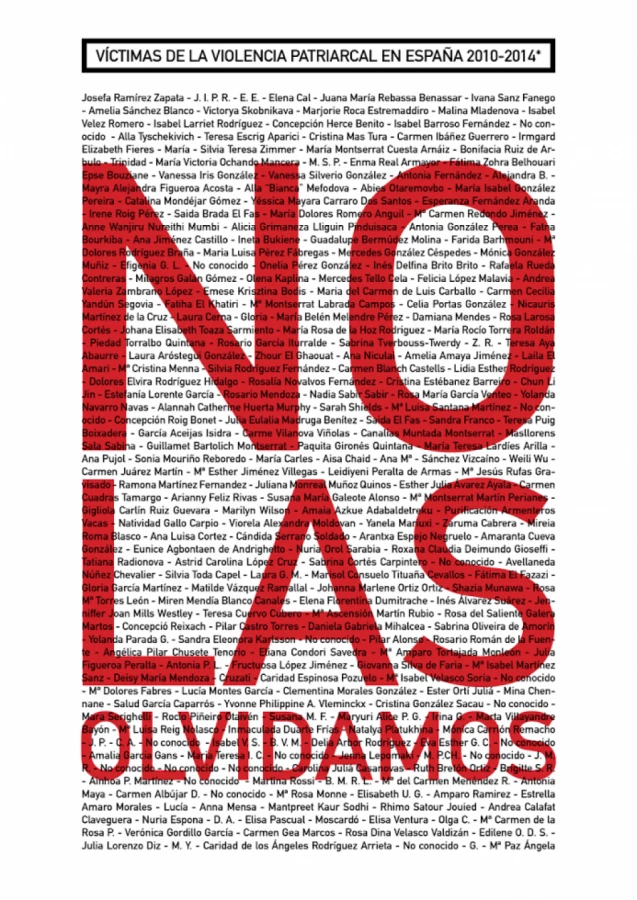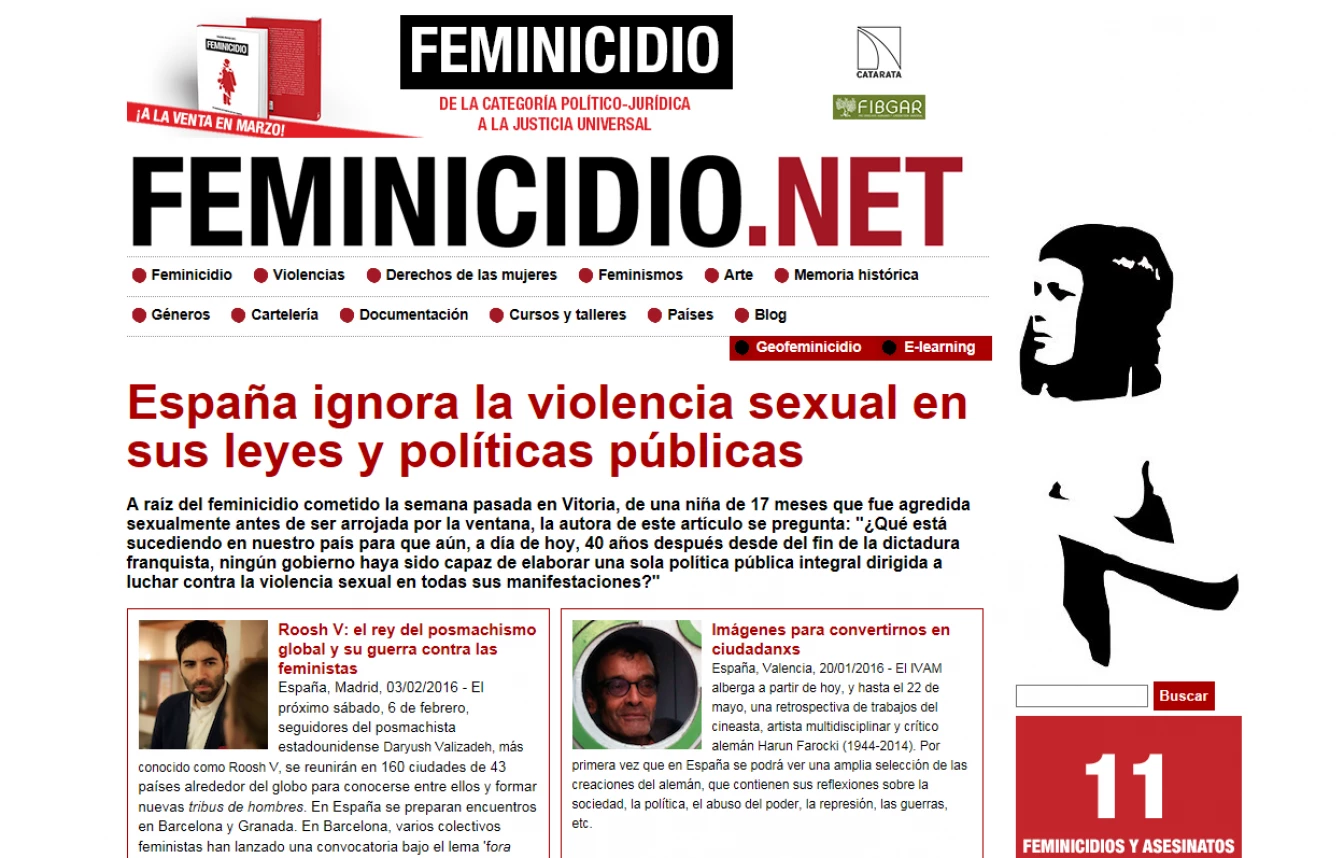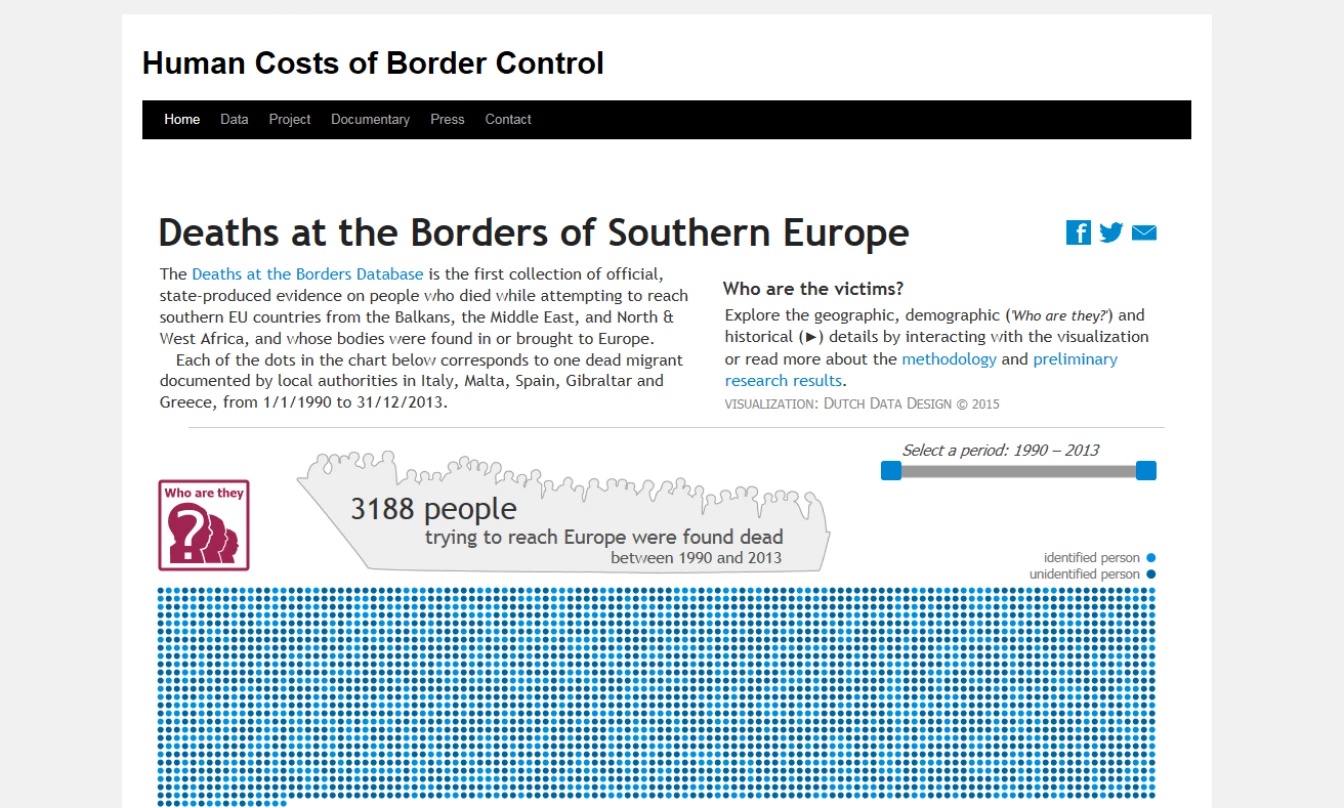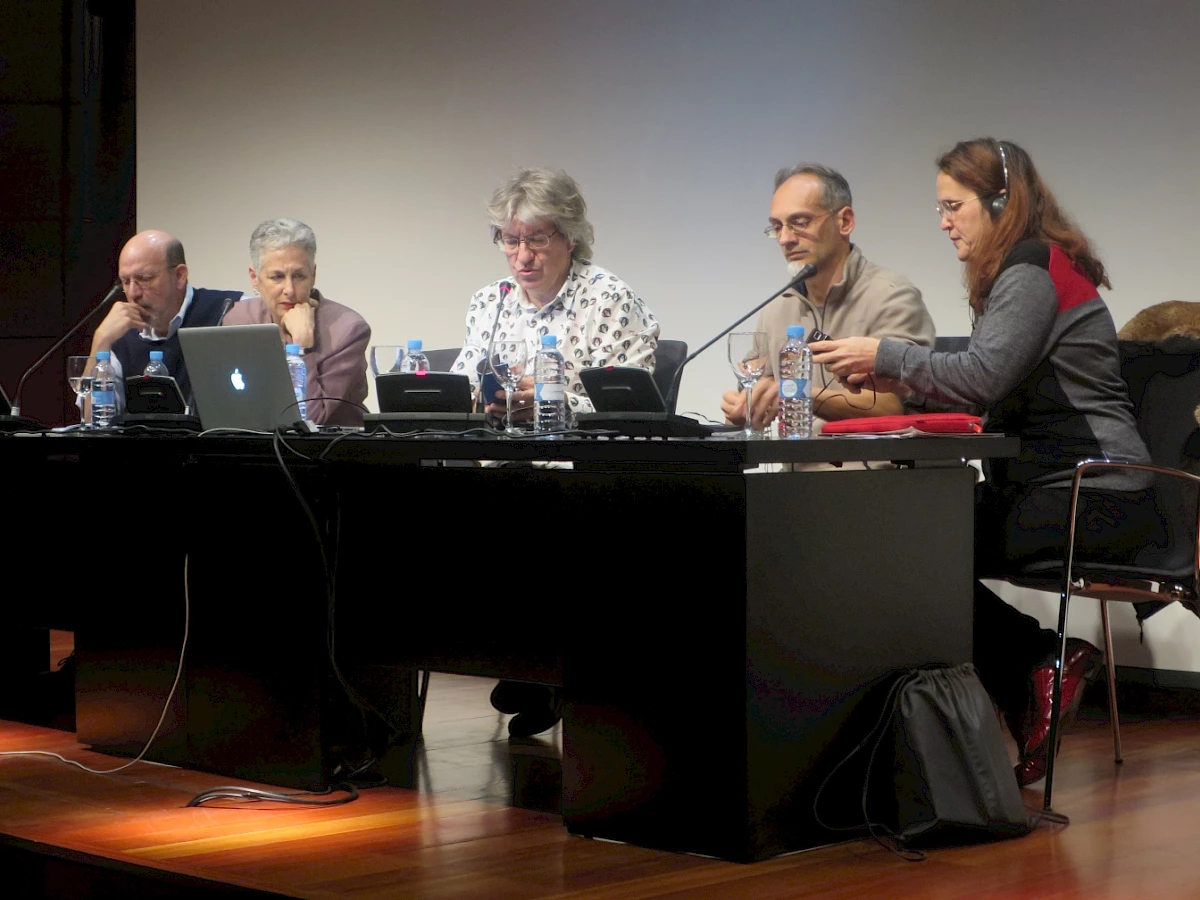
Names of the women murdered between 2010 and 2014. Design: Francisco Gatica. Courtesy of Feminicidio.net.
The Museo Nacional Centro de Arte Reina Sofía in Madrid seeks to produce a concept for archives, and possible models for its practical implementation by the museum, using the paradigm of the commons to: (1) reflect on matters relating to social, cultural, artistic, political, and historical memory in the present, with the work of the archives that produce, conserve, and transmit it; (2) analyse the importance of caring for the common heritage of the collective memory of minor and subaltern groups, so as to shape historical memory and the cultural perception of social time from the perspective of social, artistic, and enunciative practices that are not ordinarily part of the dominant public sphere and do not use the prevailing channels of social expression and communication, and (3) consider how these archival practices can contribute to a new framework of political and social imagination that will strengthen the democratic nature of our societies at a time when the homogenisation of discourse inevitably equates to the end of the democratic prospect of communicative action and, as such, of political constitution.
The idea is to extend the Museo Reina Sofía's paradigm of the "museum of the commons" and apply it to the organisation and conservation of the countless types of archives that proliferate in the social field in the form of different models and forms of organisation, and that are essential to organising and making accessible the experience and historical perception of the present. This notion of the "museum of the commons" draws attention to the profound changes that have transformed the museum over the past few decades as a result of (1) the deconstruction – or rather, the irreversible and unmitigated destruction – of the paradigms of modernity and postmodernity; (2) the profound economic, social and political crises sweeping our societies and their forms of artistic, institutional, political, and cultural representation, and (3) the structural changes to cultural institutionality and its artistic vessels, its audiences, its reference groups, its constituencies, and its users in general, as a result of the modification of the processes of production of value and surplus value, and hence productive, artistic, political, and economic changes, which have, in turn, affected countless perceptive, cognitive, aesthetic and artistic behaviours, and the products and artefacts derived from them.
Over the past few years, this interest in archives has taken the form of a complex networked ecosystem in which the Museo Reina Sofía, along with other agents (principally the Red Conceptualismos del Sur or Southern Conceptualisms Network, and also Fundación de los Comunes or Commons Foundation) and institutions in Spain and Latin America, has supported the implementation of archival policies extraneous to the logic of the market and to the nationalisation of artistic collections. Part of this process has entailed formulating a narrative from a position enunciated through the plurality of accounts generated by the agents involved (particularly the archipelago of initiatives that cluster around the Red Conceptualismos del Sur). It has also called for the use of public, social, private and communal shared resources, and the materialisation of conservation strategies and initiatives that are assembling a new "archive of the common" through the specific practices of recovery, conservation, and public dissemination, particularly in Latin America. The aim of these initiatives has been to reflect on the idea of "common heritage" based on the different possible shared ownership models, and on the urgent need to prevent the expropriation, co-optation, and monopolisation of collective memory and of its different forms of social construction and expression.
This research initially involves: (1) the conceptualisation of the archive – in today's context of highly volatile information, memory and social communication – as a vessel for collective memory, linked particularly to the knowledge and practices of the dominated classes and subaltern groups, who face increasing difficulties when it comes to creating narratives of contemporary practices of their situations, and of the interconnections between these, the experience of history and the creation of other forms of politicising their collective and individual lives; (2) the definition and description of the manner in which these archives – which sustain an important common wealth of shared memory, experience, and identity – can be created, managed, conserved, and opened up to citizens and to the public in general, in an exercise of civic and democratic culture, irrespective of the criteria of belonging to a particular nation, or of having sufficient financial means for their use and enjoyment, and (3) the creation of possible models for the co-participation of public and private bodies in organising, managing and protecting these archives, and in ensuring their feasibility given their vulnerability on two fronts: the threat of privatisation (for instance, the collective memory of certain struggles or major social events that have shaped the experience of the present but have been sidelined by the media, academic and institutional establishments' modes of production of discourse and memory, as in the case of the collective memory of the Madrid train bombings on 11 March 2004,1 of the cycle of struggles around the 15-M Movement,2 of the migrants who have died in the Strait of Gibraltar and the Mediterranean,3 and of the victims of gender violence in Spain and Latin America).4
The "archives of the commons" is based on the notion of the archive as an engine for political activation in the present. It also seeks to establish devices that do not annul or objectify the grassroots systems that gave rise to these exercises in the conservation of memory, which give the archive its value and the inventive potential of a new institutionality. The museum is aware of how terribly easy it is for them to succumb to absorption by public institutions or to commercialisation by private institutions. In order to explore these problems further, the research will be organised around three principal core areas of reflection: (1) archive models and the institutional forms that make the archive possible; the idea is to present and analyse a broad survey of repositories created from the 1970s to the present, and to talk to the custodians of this material and immaterial collective memory about their aims and their forms of organisation; (2) archive economies and the methods and protocols that ensure the dissemination and sustainability of archives without sacrificing their idiosyncratic identity or their difference, while guaranteeing socioeconomic and political accessibility, as well as high standards of conservation, and (3) the techno-political tools that can be used to organise the archive, as instruments that guarantee openness, dynamic taxonomies and universal accessibility as a sine qua non of archives of the commons.
This research will be organised around the following theoretically-strong hypotheses that will generate the working protocols and, at the same time, be tested as the research proceeds.

Feminicidio.net (Femicide) is a web portal that puts the spotlight on gender violence in Spain.
Hypothesis 1.
Archives of the commons are common by nature, and defend the commons.
The fight against new enclosures ties in with the defence of the archive as a commons, and as such its management models must simultaneously enable: (1) the construction of decentralised, open, diverse, democratic "exercises in memory" generated by subjects connected to the need to preserve the historical memory in question, and (2) a form of conservation and feedback that ensures that the growth, accessibility, conditions of use and quality of access of the archive are diverse, democratic, and universal. To this end, the research aims to explore the institutional strategies that guarantee the emergence of this new ecology of memory, as well as the common reconstruction of history through the creativity of modes of conservation of social experience. Unless collective memory has the opportunity to re-create and construct itself from the perspective of different groups, experiences of shared interests, political orientations, intellectual sensibilities, and senses of historicity, there will not be the minimum diversity required to build the new fragments that make up the social imagination. And this new ecology of memory and construction of the social – and therefore political – imagination will only be feasible if the experience of historicity and of the archive of the commons can guarantee the distributed and decentralised production of the information commons, which is its bedrock. These information commons are thus the fundamental element that the archive initially produces or could produce. Today, the information commons are subject to powerful processes of enclosure that seriously hinder the creation of archives of the commons and their potential role as key devices for the distribution and interaction of social memory. From the perspective of the archives of the commons, the information commons contribute to building the knowledge commons of the historical sense of collective memory. Both types of commons must be specific areas of reflection within the field of the archive of the commons, and they must be at the centre of production of a new institutionality. This hypothesis could also be formulated as an affirmation by which the archive of the commons is a device that produces and guarantees access to and conservation of the new information and knowledge commons, and that, in its operation, counteracts, opposes, or blocks the social, institutional, and technological enclosures that threaten these material and immaterial commons. This dual action is what guarantees the construction and democratic use of the archives of the commons.
Hypothesis 2.
An archive of the commons must necessarily be decolonial and, by historical imperative, an object of decolonisation.
Archives of the commons are archives organised around a critique of the violence of modernity vis-à-vis processes of memory construction, of the hierarchisation of different peoples, and of the creation of hermetic circuits of socioeconomic and cultural reproduction. They also encompass the plundering of the objects that have embodied this memory, both in the global sphere of modern imperialism – historically speaking – and in the politics and micropolitics of (post)modernity practiced in today's national societies. There can be no archives of the commons, let alone "museums of the commons" unless the construction and operation of these new institutionalities are founded on decolonial criteria and on the decolonisation of their practices and contents.
The decolonial criteria particularly tie into the possibility of organising the collective memory of ethnically invisibilised or racialised subaltern subjects who live in Europe and beyond, in countries that often deprive them of the right of citizenship and of basic civil and political rights. This is a huge obstacle to the possibility of producing archives of the memory of the different social, cultural, political, and existential situations that are so overwhelming and on such a large scale that they form part of the social experience tout court of the societies in which those populations without rights are present. The same applies in terms of access to these repositories of memory, which often focus on social groups made up of subjects whose life stories involve people who live and move through different national territories for family, cultural, or socioeconomic reasons. These subjects and these individuals may be interested in consulting, accessing, and using these archives, but they may find it difficult to do so due to the current structure of the system of states, in which borders, checkpoints and the lack of international mobility are obstacles to large sectors of the world's population. The work of the Human Costs of Border Control archive is a paradigmatic example of this situation, given that its content and collective memory have to do with individuals and communities whose lives are influenced and mediated by the existence of borders and mobility controls that drastically affect their existence, their lives, and sometimes their deaths.

Human Costs of Border Control. The Deaths at the Borders Database is the first collection of official, state-produced evidence on people who died while attempting to reach southern European Union countries from the Balkans, the Middle East, and North & West Africa, and whose bodies were found in or brought to Europe.
Hypothesis 3.
Archives of the commons must be democratic, non-discriminatory, and generally accessible to all actual and potential users; this accessibility must be built in to their design, their structure, and their operation.
Archives of the commons must opt for technologies and forms of sourcing and accessing content that are as open as possible, so that their use is not filtered for financial, cultural, political or national reasons, either by institutional design or as a result of the technology architecture. This means that the physical and the virtual use of these archives must be conceived in accordance with the criteria of maximum access, from the perspective of connectivity, capacity, content, and context. The technology design should not limit the objective potential of the Internet, which is never neutral, by failing to take into account the limits affecting these four hypotheses for the use and enjoyment of these archives. Archives of the commons are based on the hypothesis that technology is inherently social, and that this social dimension must be carefully taken into account to ensure that good technological strategies are not ruined by the failure to take into account the social inequality that affects the potential use of these tools by different social and economic groups due to the great variations in their cost and affordability.
Archives of the commons should thus think about Internet connectivity as a prerequisite that is essential but not sufficient to enable the production of information and knowledge commons. Similarly, archives of the commons must take into account that working on specific user profiles, and the ongoing attention to inequality in regard to the skills and the socioeconomic, educational, and cultural status of the population in general are essential for achieving equality in the use of these commons.

Round-table discussion: "The Future of Memory and the Expropriation of the Political Sense of the Present". Participants: Jorge Reina Schement, Nancy Kranich, Carlos Prieto, William Gambetta, and Ariella Azoulay. Museo Reina Sofía, 12 December 2015. Photo: Courtesy of Red Conceptualismos del Sur.
Hypothesis 4.
An archive of the commons is a device for the reconstruction of memory and of the historical-political sense of the present; this is due to its process of creation and because of the possibilities it offers to interested parties, groups, collectives, and citizens.
Given that collective memory is a means of building social domination in the imaginary and symbolic spheres, the archive of social movements – which have played a crucial role in history but have been defeated as political actors with the capacity to organise the dominant institutionality and its production and conservation – must operate under a different logic: one that is created, defined, and implemented in the specific conditions in which the struggle for the meaning of the past and the present is being played out today. In these socioeconomically turbulent times of huge technological innovations, and major changes in the political subjectivity of social actors, the archive of social movements becomes key to the invention of the future in terms of collective action and of the activation of social energies. This collective memory of social movements is essential for debating possible lines of action that seek to invent alternative forms of institutional, social, and political organisation, and other models for human relationality and coexistence.
In 2016–2017, the Museo Reina Sofía's main lines of work with regards to archives of the commons are: (1) to continue to explore the nature of archives of the commons, in order to gather and produce documentation and analyses that can encourage and begin a public debate on this new modality, actively involving as many agents as possible in the discussions. The idea is to bring about broad public debate on the statutes, models, financing, and management of the archives of the commons; (2) to define working methods and sequences of objectives that will ensure that the activities organised around this subject – based on ongoing public engagement – will generate a solid collection of materials that can be used in different forums and with the different agents that the project comes in contact with or that it sets up collaborations or working relationships with, through the museum.
During the next two years, the museum aims to achieve the following objectives: (1) to theoretically and sociologically define what an "archives of the commons" is in the present and what it could become, and the possible forms of operation and organisation, from the point of view of organisation, conservation, access, and operation; (2) to specify the social needs that this kind of archive meets in the current social context, and the social objectives of this kind of "institution of the commons" in conserving, recreating, and expanding a democratic public sphere in times of social crisis and crisis of financialisation in the worlds of art, culture, and the economy, with the resulting impact on the modes of creating and recreating collective memory, and (3) to explore the right to collective memory, and to its conservation and study, of subaltern groups and subjects who have to deal with media, cultural, academic, and institutional realities that have been and are increasingly impermeable to their voices.
The programme of activities that the Museo Reina Sofía will organise will thus be oriented towards an accumulative, work-in-progress method in order to produce a series of "products" that could initially be as follows: (1) the conceptual design of the institutional model of the archive of the commons as a device for managing documents, artworks, and aesthetic and socio-cultural artefacts; (2) the definition of a model or models of statutes for archives of the commons, and modes of operation that can guarantee their stability, dynamism and accessibility in accordance with the hypotheses and premises explored in the research process so as to contribute to the new social institutionality of the commons; (3) a debate on the archive's forms of relations with private agents and with public institutions, in order to explore the possibilities of creating a new regime of organisation and operation that explores the commons statute of this type of institutionality; (4) the creation of training protocols for people who directly manage archives of the commons, and of educational tools for this purpose; (5) the sharing of management tools that can contribute to creating this institutionality of the archives of the commons, so that they can be used and shared by archives that work along these lines of organisation and operation; (6) the definition of models of financing and sustainability for archives of the commons that guarantee their continuity and ensure their high quality and social impact through general access; (7) the definition of employment sustainability models for the persons who work directly with archives of the commons, and sustainable models for financing, co-financing, or involving public and private organisations; (8) the creation of legal statutes for archives of the commons and the study of the possible implications of their existence within institutions, as well as possible models of legal regulation that guarantee their common nature; (9) the definition of the possible legal status of archives of the commons as an agency that is recognised and supported by public institutions with a view to promoting the creation of a new public sphere that leads to innovative processes of democratic and social incorporation, and (10) the analysis of new intellectual property models that may be useful for allowing general access to the material contained within the archives of the commons.
The products resulting from these research dynamics will operate in the public sphere as artefacts and discourses, generating debates and lines of consensus on the issues underlying the institutional creation and definition of the archives of the commons.
Translated by Nuria Rodríguez